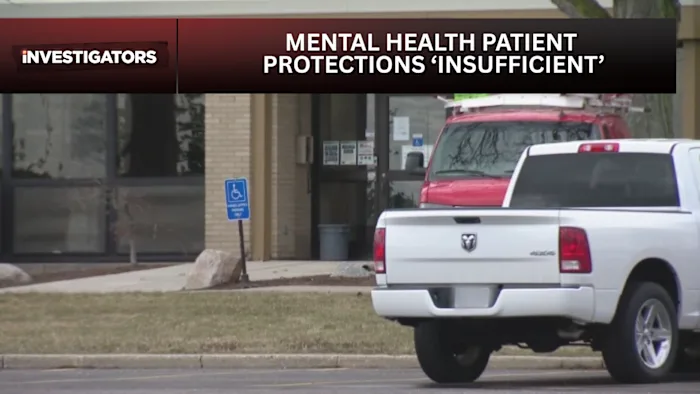
A report from Michigan’s Office of the Auditor General is bringing attention to concerns within the Office of Recipient Rights.
This audit is tied to a story the Investigators at Local 4 broke. An unannounced active shooter drill was held at Michigan’s only state psychiatric hospital for children in December of 2022.
After our reporting, a lawmaker asked for an audit of the agency who oversees Michigan’s mental health hospitals — the Office of Recipient Rights. It’s the agency that handles complaints, violations for the state’s 5 mental health hospitals.
“The audit really shed light on what, unfortunately, too many families and patients already know, which is that we deserve a better system,” Michigan Sen. Michael Webber said.
Here’s a look at what the auditor general’s report found:
Nearly 30% of the complaints it looked at alleging abuse, neglect, serious injury, or death were not retrieved or acted on until 2 to 12 days after being filed. According to the state’s own training materials it is supposed to react within 24 hours.
More than 10% of complaints lacked a date stamp — making it impossible to determine if action was taken in a timely manner.
Video surveillance at the five state hospitals was often missing or not working.
“They understand that there’s problems and challenges that we need to work through. So, now, it becomes, you know, what can we do from a legislative standpoint? What can we do from an oversight standpoint?,” Webber said.
—> Find full coverage of the Hawthorn Center investigation here.
Let us know if you have had an experience with the Office of Recipient Rights by emailing the Investigators at Local 4 at Local4Investigators@wdiv.com.
Here’s a deeper look into what the audit uncovered:
Problems with how violation complaints are collected
Audit found that the Office of Recipient Rights needs to improve how it collects alleged rights violation complaints. MDHHS agrees with the finding.
The audit found that the Office of Recipient Rights isn’t doing a good enough job collecting violation complaints — and the agency agrees, saying it would review its process.
According to the audit, 70% of complaints are submitted to the Office of Recipient Rights through drop boxes in state psychiatric hospitals. But according to the agency, they typically only check those drop boxes twice a week.
The other 30% of complaints are sent either in-person, via email, mail, telephone, or fax. Those complaints are collected by the agency at “varying frequencies.”
The audit reviewed 240 complaints that were received between Oct. 1, 2021 and July 31, 2024. They found that the Office of Recipient Rights “did not collect and evaluate complaints daily.”
They also found that the “ORR could not always ensure it immediately initiated investigations for complaints alleging abuse, neglect, serious injury, or death involving a rights violation.”
Almost 30% of complaints the audit looked at alleging abuse, neglect, serious injury, or death were date-stamped between 2 and 12 days after the complainant’s date.
More than 50% of complaints alleging other violations were date-stamped between two and 53 days after the complainant’s date.
The audit highlighted the “potential risks to recipients if there are delays in imposing necessary remedial actions to address complainants’ allegations, especially those related to abuse, neglect, serious injury, or death.”
MDHHS said it “agrees with the finding and recognizes there are always opportunities for process improvements.” In its response, MDHHS notes that there isn’t a national mandate or standard to collect and review complaints daily — but it will “review the complaint retrieval process and determine if any changes are needed to ensure timely notification of allegations of abuse and neglect.”
Audit: ORR not responding to complaints fast enough
Office of Recipient Rights is required to immediately initiate an investigation for complaints involving alleged abuse, neglect, serious injury, or death.
In one case the Office of Recipient Rights took more than a year to complete an investigation into allegations of neglect — the allegations were proven true.
Investigations were not immediately started for more than 30% of abuse, neglect, serious injury, or death complaints the audit sampled.
The audit notes that a faster response from the ORR would help protect patients.
The audit found that the Office of Recipient Rights needs to improve its “timeliness” for how it assesses and investigates complaints.
The report stated that, “doing so would help ensure potential risks of harm to recipients’ well-being and/or rights are minimized . . .”
The audit sampled 240 complaints that were received between Oct. 1, 2021 and July 31, 2024. It noted that 26 (11%) of those complaints hadn’t been date-stamped. Because they were lacking a date, the auditor couldn’t tell if the ORR reacted in an appropriate time. Six of those unstamped complaints involved allegations of abuse, neglect, and/or serious injury.
Ten of the 31 date-stamped complaints that alleged abuse, neglect, serious injury, or death, with a completed investigation — the dates show that the ORR did not initiate the investigation within 24 hours. The investigation ranged between 2 and 17 days after the complaint was received.
“Timely acknowledgment is particularly important when ORR determines neither an investigation nor an intervention is warranted because it is the only ORR communication sent to complainants in these situations,” the audit states.
For the 56 completed investigations reviewed by the auditor, 16 were overdue by a week or more. The Office of Recipient Rights took between 98 days and nearly 14 months (416 days)to complete those investigations.
According to the ORR, the number of complaints received, staffing errors, and employees’ availability for interviews are reasons investigations might be delayed.
One example the audit highlighted was an incident where a patient swallowed construction hardware while under a one-to-one patient to supervisor order. The patient needed surgery to remove the hardware they had swallowed.
In that case, the ORR didn’t initiate its investigation immediately. There were multiple status reports that either weren’t completed or were completed late. It took the ORR more than a year to complete the investigation — even though the allegation was found to be true.
Audit finds problems with video, audio recording at state psychiatric hospitals
Video surveillance was available at all 5 state psychiatric hospitals, but cameras weren’t always recording.
Audio recording was not available or was unreliable at all 5 state psychiatric hospitals.
All 5 state psychiatric hospitals that were open during the audit had video surveillance — but the cameras weren’t always recording.
Three of the five state psychiatric hospitals didn’t have audio recording, and the other two had unreliable audio recording.
For 28 of the 63 sampled investigations, video and/or audio evidence may have helped in the investigation.
The state said in its preliminary response that it disagrees that monitoring the capability and availability of video surveillance systems is its responsibility.
The report also noted that the Office of Recipient Rights didn’t have a process to regularly monitor state psychiatric hospital incident reports to check for rights violations.
State psychiatric hospital employees are required to report all incidents of abuse or neglect to the Office of Recipient Rights. The audit raised concerns that the Office of Recipient Rights didn’t monitor that state psychiatric hospital employees are properly trained.
In an April 30, 2025, letter from Elizabeth Hertel to Webber, Hertel stated that “the camera systems for each hospital are robust and in working order. They are checked daily and when there is a problem, the vendor is contacted to make repairs, which is handled by the Department of Technology, Management, and Budget. It should be noted that while these cameras are stated to be in patient care areas, there are areas where cameras are not allowed where staff and patients still interact, such as patient rooms, bathrooms, and shower rooms.”
Concerns over conflicts of interest
Audit states that the Office of Recipient Rights should “strengthen its monitoring of rights advisors’ independence . . .” that’s because they are responsible for investigations and are not required to disclose potential conflicts of interest.
According to the audit, the Office of Recipient Rights doesn’t require advisors to disclose potential conflicts of interest.
“. . . its investigation reassignment practice for disclosed conflicts may not fully address potential advisor familiarity biases nor does it address the impact of conflicts related to the collection, date stamp, logging, evaluation, and categorization of complaints and/or conducting interventions.”
The MDHHS Employee Handbook does prohibit employees from taking actions that may be considered a conflict of interest with their employment.
In its response, MDHHS, said that the “ORR disagrees that rights advisors stationed on the site at the SPH (state psychiatric hospital) and completing the essential functions of their jobs are inherent conflicts of interest.”
Improvements needed in how patients are told about their rights
Office of Recipient Rights needs to make sure patients know their rights and may not currently be complying with state law, audit says.
According to the audit, the Office of Recipient Rights needs to take steps to improve how it communicates guaranteed rights to patients.
This includes telling patients about services that are available to them and giving them contact information for the Office of Recipient Rights.
The audit found that the Office of Recipient Rights didn’t always post standardized signage or the required Office of Recipient Rights information.
This chart breaks down the number of state psychiatric hospitals and which ones were missing required information:
*According to the audit, Water Reuther Psychiatric Hospital has 5 units, but one unit was under quarantine when the auditors were on site and they weren’t able to walk through that unit.
—> Lawmakers, advocates push for protections for Michigan psychiatric patients
MDHHS statement on the audit
On Tuesday, Sept. 30, 2025, the Michigan Department of Health and Human Services spokesperson released the following statement in response to the audit:
“The Michigan Department of Health and Human Services is committed to ensuring Michigan residents seeking behavioral health services can exercise their rights under the Michigan Mental Health Code and that individuals who believe their rights have been violated have their rights complaints addressed.
“According to the Mental Health Code, the MDHHS Office of Recipient Rights is responsible for promoting and providing rights protection to individuals admitted to state psychiatric hospitals; monitoring the quality and effectiveness of recipient rights protection systems at Community Mental Health Services Programs (CMHSP) and psychiatric hospitals (LPH) licensed by the Department of Licensing and Regulatory Affairs; and providing technical assistance and training to internal and external stakeholders.
“As part of that requirement, ORR staff received and resolved nearly 5,000 complaints from the state psychiatric hospitals over the three-year audit period. ORR also assessed the rights systems of 39 CMHSPs and 50 LPHs and conducted numerous trainings for more than 800 recipient rights, CMHSP and LPH staff.
“The department recognizes there are opportunities for process improvements and has already taken steps to improve the timeliness of reports; requested appropriations for additional staff to focus on ORR duties; hired staff to coordinate the rights appeals process; and updated its monitoring of required ORR training for all MDHHS staff.
“However, the department notes that some findings by the Office Auditor General (OAG) were outside of their scope of knowledge, such as how to categorize complaints and what evidence is necessary to establish a preponderance of evidence to determine if a right has been violated. They relied on their own expectations on how ORR should operate versus the requirements of the Mental Health Code and standards established through education and training.
“Additionally, OAG held ORR accountable for duties that are the responsibility of other entities such as monitoring the capability and availability of state psychiatric hospital video surveillance systems and reviewing all state psychiatric hospital incident reports, even those that do not pertain to an ORR investigation.”



